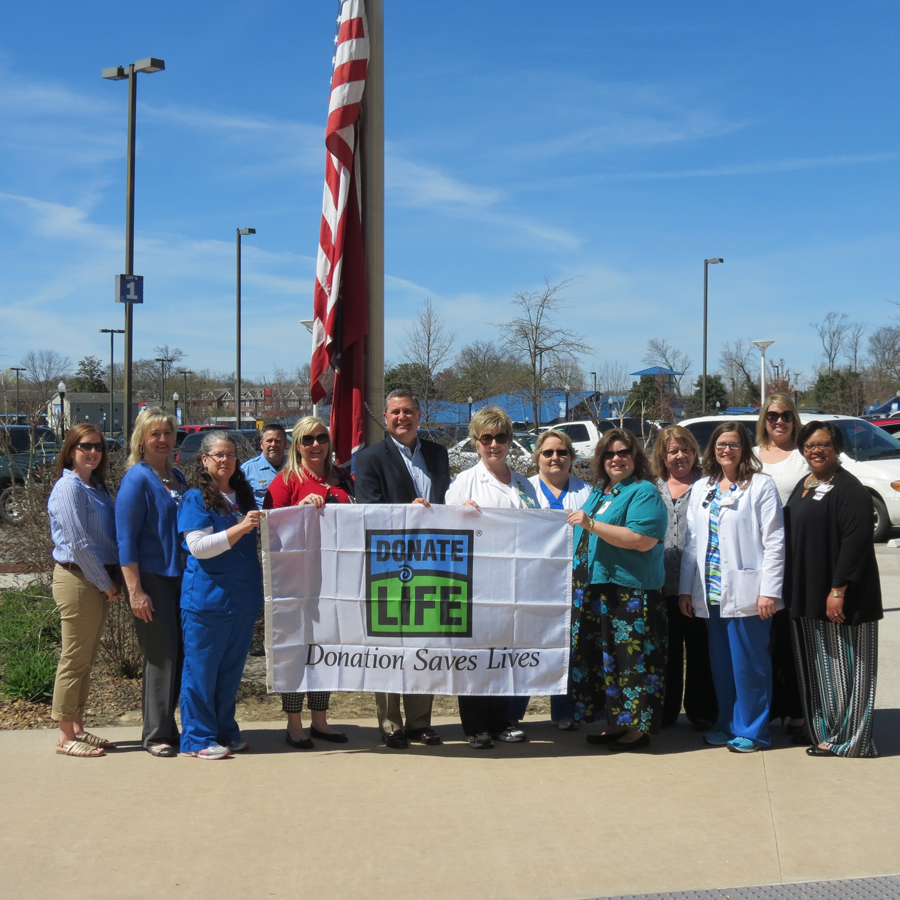
From the left is Hannah Rinks, R.N.at CRMC; Chevelle Johnson, Assistant Director of Patient Care at CRMC; Mary Stoltz, Emergency Department Manager at CRMC; Jamie Deneau, Clinical Nurse Specialist at CRMC; Paul Korth, CEO at CRMC; Lenora Barber, recipient of a liver donation; Terry Morse, OR Educator at CRMC; Denise Fugatt, Sr. Hospital Services Coordinator for Tennessee Donor Services; Teresa Jones, ICU/CVICU director at CRMC; Angela Craig, Clinical Nurse Specialist at CRMC; Kami Spurlock, Tennessee Donor Services Bridge to Life Manager ; and Danette Gardenhire, Respiratory Therapy Director at CRMC.
COOKEVILLE-Cookeville Regional Medical Center is raising the Donate Life Tennessee flag during the month of April in honor of those who have given and received organ and tissue donations. The month long celebration honors the generosity of organ, eye and tissue donors and their families and commemorates all transplant recipients in the United States.
“Cookeville Regional is honored to recognize the donor families and hospital staff in the patient units who provide care to these individuals and their families,” said Paul Korth, CEO at Cookeville Regional Medical Center. “We support this ongoing effort to raise awareness for organ donation. Raising the flag is one more way to say thank you to those who have given and received donations.”
In 2014, Cookeville Regional had 30 patients that were organ and tissue donors. They transplant more than 1,000 tissues each year into their patients. That includes bone, cartilage, heart valves and corneas.
Cookeville Regional was given the privilege to meet a recipient of a liver donation. Lenora Barber, 71, was a nurse who worked in surgery, shared her story and how grateful she is to this day to be alive because of organ donors.
Barber was diagnosed with primary biliary cirrhosis, a non-alcoholic cirrhosis of the liver, in 2009. She was a nurse for many years, but retired after she became sick and was put on the liver transplant list. Barber’s illness continued to get worse, losing over 100 pounds, but then she received a phone call that would change her life.
“They called me and said they thought they had found a liver for me,” Barber said. “It took 10 weeks to receive that phone call, but I had an odd blood type and everything matched up. I was in the OR (operating room) by 5:30 p.m. getting the transplant. They told me that I may have only had another couple weeks left before receiving the transplant.”
Barber being a nurse and even working in donor procurement gave her a different outlook on the process.
“The wait was complicated. I had worked in surgery all these years, even watched organ procurement, and never expected to need one. Waiting is a slow way of dying. I have seen both sides now. There are no words to say how much I appreciate what the nurses do for organ and tissue donation,” said Barber.
Barber now stands before a nursing class teaching in Chattanooga, Tenn., and her students are in awe that she is alive today. She has recovered well and had no organ rejection episodes.
“I am beyond grateful. I don’t know what to say other than thank you. I enjoy life and never take a day for granted. It is a miracle that never gets old,” said Barber. “Most people have the privilege of writing their donor family, but I have never been able to connect with mine. I don’t really know her, and I probably never will, but I am now a part of her legacy. I am more passionate about donation than ever.”
In 2014, 4,141 Tennesseans gave the gift of life, saving 818 lives. Tragically, the need far exceeds the number of those who give. While most Americans are in favor of donation, many believe they are too old or unhealthy to donate, and others simply don’t take the steps required to sign up. Almost everyone can be a donor. There is no age limit to organ donation and very few diseases preclude donation. Currently in the United States there are more than 123,000 people waiting for a life-saving organ transplant, over 2,700 of those live in Tennessee. Every 18 minutes a patient on the waiting list will die, and every 10 minutes a new name will be added.
Jamie Deneau, Critical Care Nurse Specialist and Donation Committee Chair at Cookeville Regional shares the goal of the committee at Cookeville Regional, “Our goal at CRMC is to help our patients that are on the list by increasing awareness regarding organ and tissue donation. Ninety percent of Americans say they support donation, but only 30 percent know the essential steps to take to be a donor. There are several ways to register to become a donor and it is not a hard process at all. There are people who would love to talk with you, and there is information out there about becoming a registered donor if you have questions. There are a lot of misconceptions about organ donations and we really encourage people to research and find out information before counting it out. Donation is a wonderful way to leave behind a legacy. This is a gift you can give to save lives.”
For more information call Jamie Deneau at 931-783-5808. There are several opportunities to register to become an organ donor. Tennesseans can register to be an organ donor by simply checking YES when applying for or renewing their driver’s license. A small red heart is placed on the driver license. And residents can also sign up online by visiting www.donatelifetn.org.

